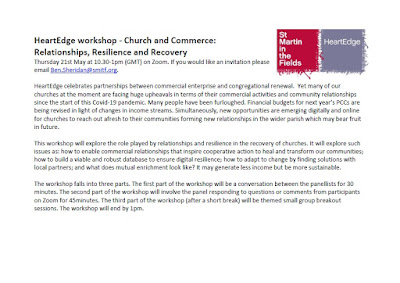This week HeartEdge shares several new offerings within the Living God's Future Now programme. For the full Living God's Future Now programme click here.
Tomorrow at 4.30pm on the HeartEdge facebook page (https://facebook.com/theHeartEdge/) we premiere a short interview with the artist Sophie Hacker. In this interview with Jonathan Evens, Sophie explores her understandings of imaging the invisible.
Sophie Hacker specialises in Church Art, including stained glass windows, vestments and re-ordering liturgical space. Since 2006 she has been Arts and Exhibitions Consultant for Winchester Cathedral, with particular responsibility for curating. Recent commissions include collaborations with musicians and poets, and numerous ecclesiastical projects.
Wellbeing Group
The HeartEdge Wellbeing Group is a reflective group providing opportunities to share thoughts and feelings as ongoing support in these unusual times. Even once a new normality has been established and restrictions further lifted, Covid and all that is associated is still going to be part of our lives. The group is limited to eight participants and will initially meet for six sessions, evolving to meet the needs of those who join. Participants need to commit to all six sessions (from 4 June to 9 July, 2.00 - 3.00 pm).
The group facilitator will be Kate Woodhouse, an experienced counsellor, registered and accredited with BACP. Kate has a wealth of experience in working with a range of mental health and wellbeing challenges, with particular experience in working with dying, death, loss, grief and bereavement.
Join the group here - https://bit.ly/2XyhFTe
For this group, HeartEdge offers a two-tier ticket option (£30 or £50 for the whole six session series). You choose the rate that best suits your needs. No matter your choice, you will receive the same experience. Those who pay more will help support the content and costs of HeartEdge events. Thank you.
Seeing Salvation: Fridays, 2.30pm, zoom meeting.
Jonathan Evens shares practical approaches to using art in church settings.
Initial sessions are:
- 5 June - Session 1: Art Trails.
- 12 June - Session 2: Art and contemplation.
- 19 June - Session 3: Art workshops.
- 26 June - Session 4: Art meditations.
- 3 July - Session 4: Exhibitions – solo shows.
Email jonathan.evens@smitf.org for an invitation.
Inspired to Follow: Art and the Bible Story
What does it mean to follow Jesus today? How can I deepen my faith in God? This programme of hour-long gatherings covers the Biblical story from Creation to Apocalypse. It uses fine art paintings that can be found in the collection of the National Gallery as a spring board for exploring these two questions. The course provides a way of deepening one’s Christian faith and exploring what it means to follow Jesus today.
What’s the programme?
Inspired to Follow: Art and the Bible Story
What does it mean to follow Jesus today? How can I deepen my faith in God? This programme of hour-long gatherings covers the Biblical story from Creation to Apocalypse. It uses fine art paintings that can be found in the collection of the National Gallery as a spring board for exploring these two questions. The course provides a way of deepening one’s Christian faith and exploring what it means to follow Jesus today.
What’s the programme?
- 7 June: Luke 1:26-38 / ‘The Annunciation’ Fra Filippo Lippi, about 1450-3, NG666
- 14 June: Luke 1:26-38 / ‘Mystic Nativity’, Sandro Botticelli, 1500, NG1034
- 21 June: Mark 1: 1-12 / ‘The Baptism of Christ’; predella panel, Giovanni di Paolo, 1454, NG5451
- 28 June: Luke 10:25-42 / ‘Christ in the House of Martha and Mary’, Diego Velásquez, probably 1618, NG1375
- 5 July: Mark 11: 4-12 & 15-19 / ‘Christ driving the Traders from the Temple’, El Greco, about.1600, NG1457
- 12 July: Mark 11: 4-12 & 15-19 / Christ washing the Feet of the Disciples, Jacopo Tintoretto, about.1575-80, NG1130
- 19 July: Matthew 26: 36-54 / ‘The Agony in the Garden’ by Giovanni Bellini, about.1465, NG726
- 26 July: Matthew 26:57-68 / ‘Christ before the High Priest’, Gerrit van Honthorst, about.1617, NG3679
- 2 August: Luke 23:26-38 / ‘Christ carrying the Cross’, Italian, Venetian, about. 1500, NG6655
The Brilliance - Breathe.
















